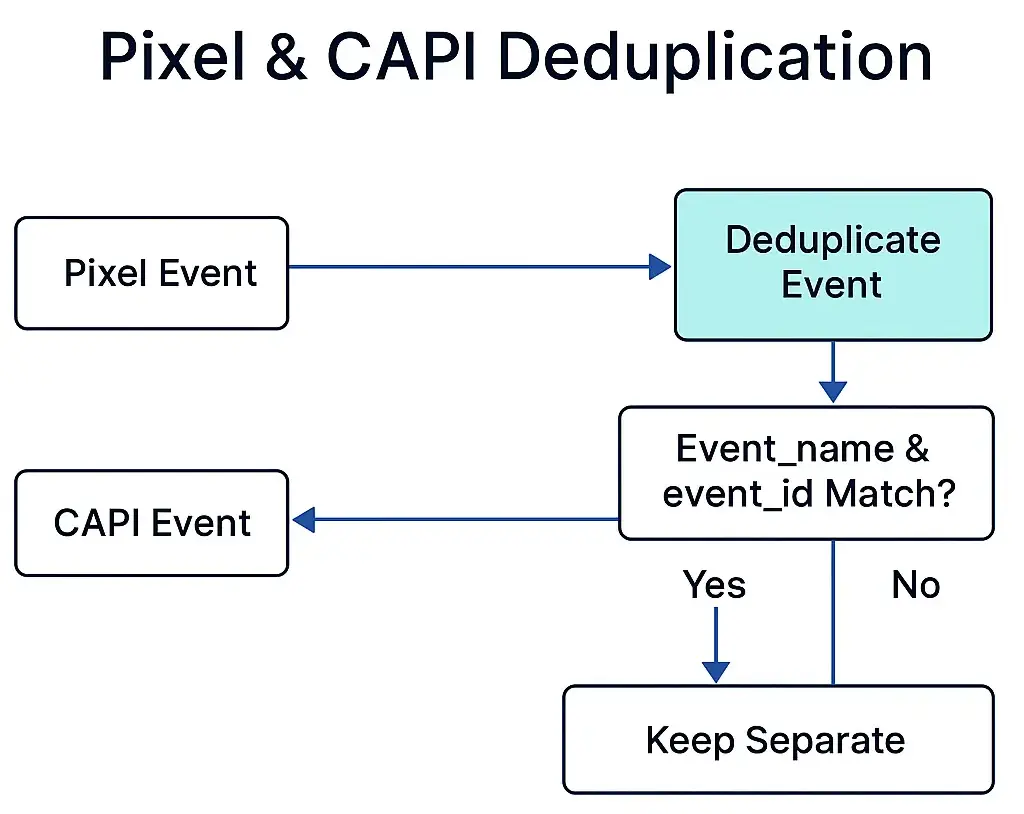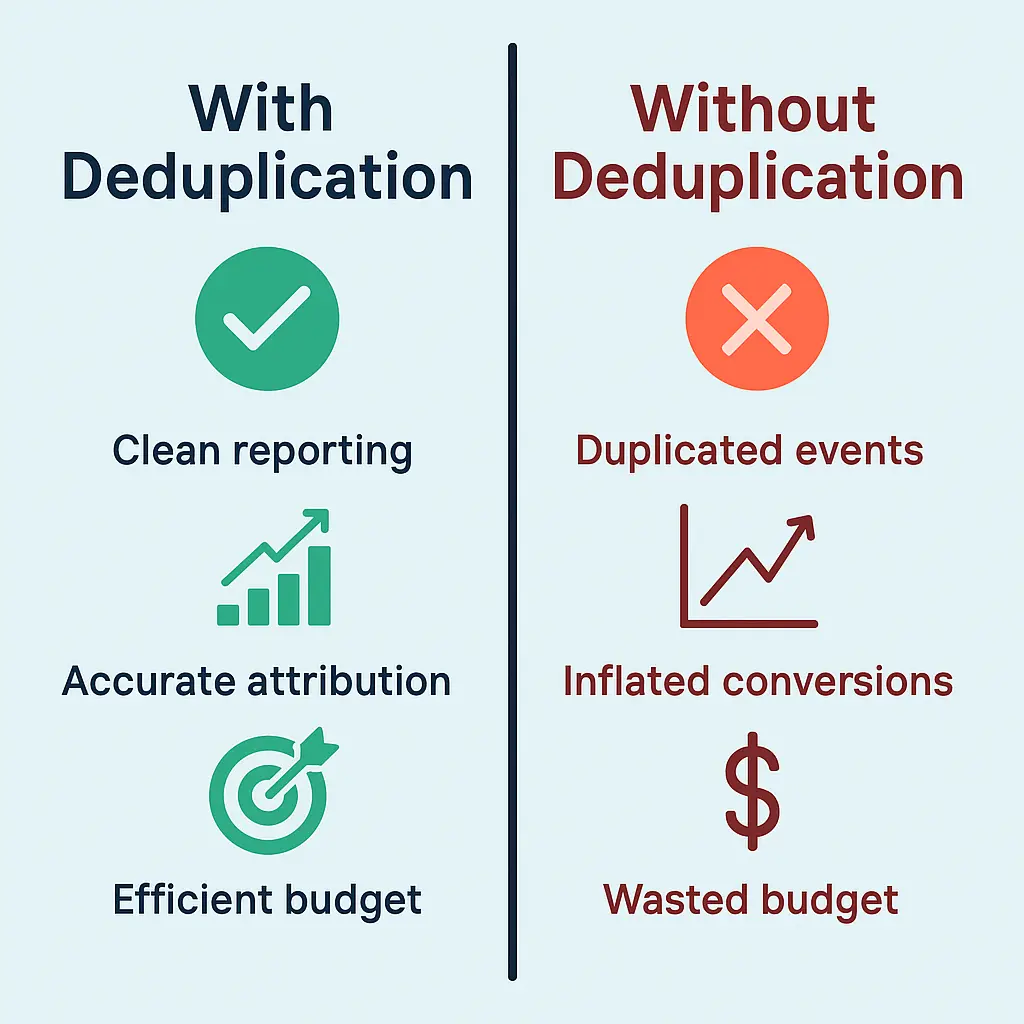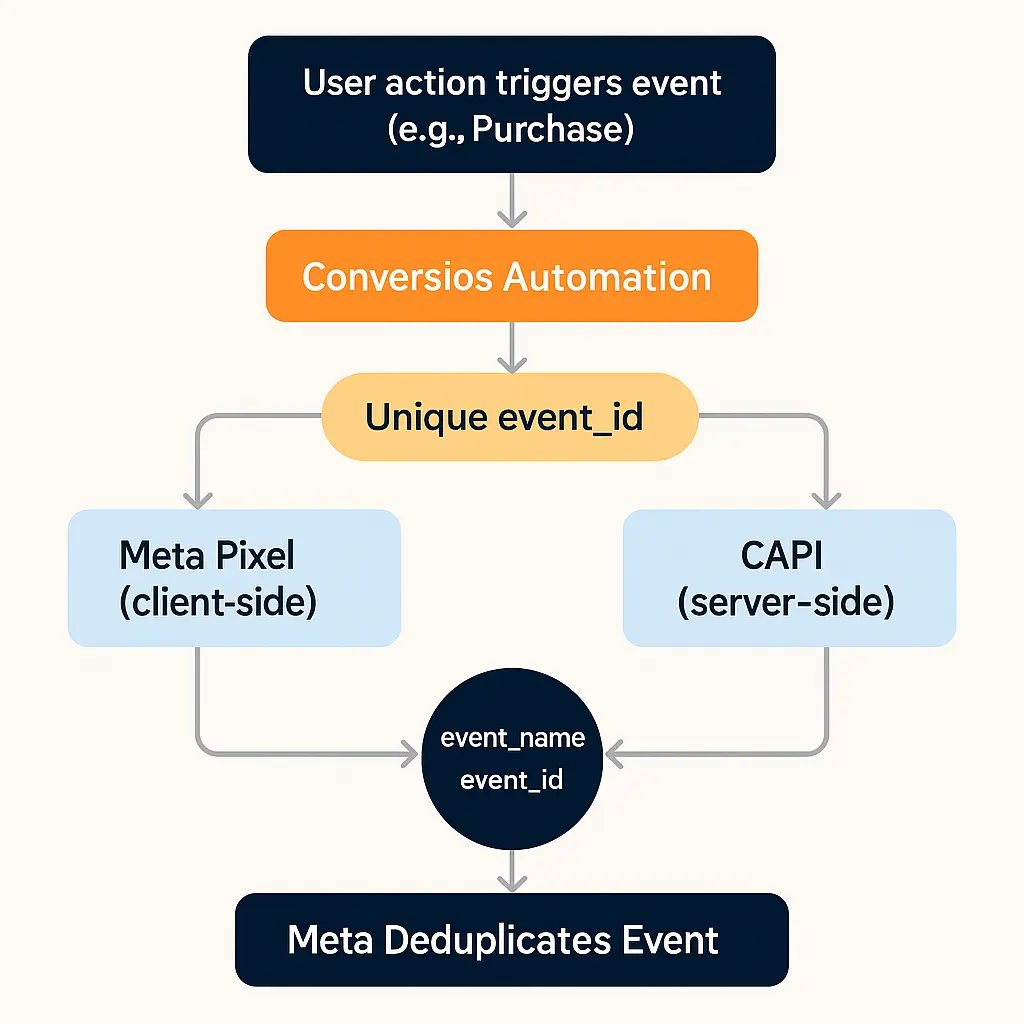If you’re running Facebook Ads with both the Meta Pixel and the Conversions API (CAPI), you’re likely duplicating your events without even knowing it. This duplication inflates your conversion numbers, distorts your reporting, and undermines your ad performance.
Event deduplication on Facebook is not just important; it’s essential. In this blog, we will clearly outline what deduplication is, why it matters, and how Conversios effectively automates this process for WooCommerce and Shopify users. Don’t let duplicated events derail your advertising success!

What Is Facebook Event Deduplication?
Facebook event deduplication ensures that Meta doesn’t count the same event twice, once from the Meta Pixel (client-side) and again from the Conversions API (server-side).
How it works: When both tracking methods send the same event (e.g., a purchase), Meta uses two fields to recognize and merge them:
- event_name: The type of event (e.g., Purchase, AddToCart).
- event_id: This serves as a unique identifier generated for each event instance.
When the event_id matches, Meta will decisively combine the server and client events into a single record. This ensures data integrity and eliminates redundancy in tracking.
Why Pixel Deduplication Matters

Setting up pixel deduplication is not optional; it’s essential. Neglecting this step leads to serious consequences, including:
- Double-counted conversions
- Distorted performance metrics
- Inefficient budget allocation
- Reduced Event Match Quality (EMQ) score
- Inaccurate lookalike and retargeting audiences
In short, failing to implement pixel deduplication undermines the reliability of your Meta Ads strategy, especially on iOS and Safari browsers, where server-side tracking is critical. Don’t let your advertising efforts suffer; prioritize pixel deduplication.
Manual Deduplication Is Risky and Complex
IIf you’re not leveraging an automation tool like Conversios, it’s crucial to understand that manual event deduplication demands a rigorous approach:
- You need a custom event_id logic tailored for every user action.
- Consistent mapping between client-side and server-side tags is essential.
- You must invest time in debugging to resolve event delay mismatches.
- Proficiency in Tag Manager or backend development is a must.
Too many store owners and marketers either overlook this process or fail to execute it correctly. Don’t be one of them.
How Conversios Automates Event Deduplication

Conversios takes care of this for you seamlessly by:
- Automatically generating a unique event ID for every tracked event.
- Ensuring the same event ID is used across both the Meta Pixel (browser) and CAPI (server).
- Syncing WooCommerce or Shopify events with pre-built triggers and tags.
- Supporting all standard events such as PageView, AddToCart, InitiateCheckout, and Purchase.
With no custom code required, you can avoid data mismatches and duplicated events.
Bonus: Improved Event Match Quality (EMQ)
Improved deduplication enhances your Event Match Quality score, leading to:
- Enhanced signal reliability
- Increased attribution accuracy
- Improved custom audience performance
These factors contribute to better ROAS and lower CPAs over time.
Final Thoughts
Facebook event deduplication is essential, it forms the backbone of effective Meta Ads tracking. With Conversios, you can forget about complicated event_id logic or clunky Tag Manager hacks. Everything operates seamlessly and automatically.
If you’re utilizing both Pixel and CAPI, let Conversios take care of the heavy lifting so you can concentrate on scaling your store with confidence.
Frequently Asked Questions
Q. What is Facebook event deduplication?
Facebook event deduplication ensures that the same event sent from both the Meta Pixel (browser) and Conversions API (server) is counted only once. It uses event_name and event_id to identify and merge duplicates.
Q. Why is event deduplication important in Facebook Ads?
Without deduplication, your events may be double-counted, which distorts reporting, wastes budget, and leads to inaccurate audience creation and low Event Match Quality (EMQ).
Q. What happens if I don’t set up deduplication?
You may see inflated conversion numbers, poor ad optimization, reduced ROAS, and unreliable remarketing or lookalike audiences.
Q. Is manual deduplication recommended?
Manual deduplication is complex and risky. It requires custom event ID logic, consistent tag mapping, debugging, and technical expertise in GTM or backend development.
Q. How does Conversios handle Facebook event deduplication?
Conversios automates deduplication by generating unique event IDs and syncing them across both Meta Pixel and CAPI. It supports all key events like PageView, AddToCart, and Purchase—no manual setup needed.
Q. Does event deduplication improve Event Match Quality (EMQ)?
Yes. Proper deduplication significantly boosts your EMQ score, improving signal quality, attribution accuracy, and the performance of retargeting and custom audiences.